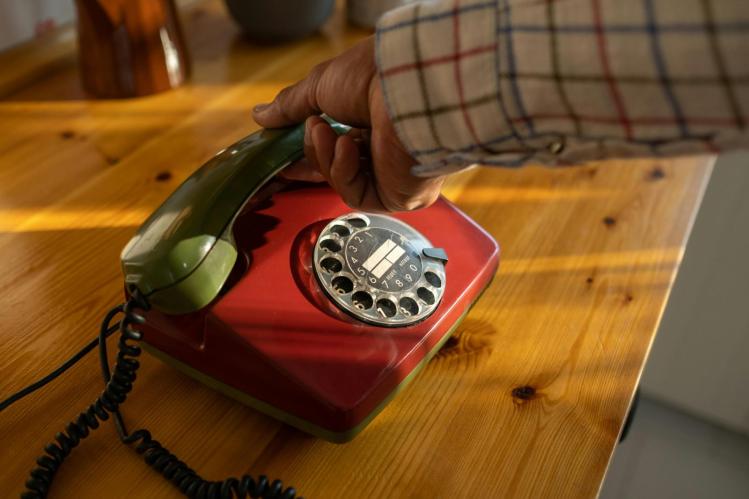
“It’s weird how sad I am,” I texted my nephew Nicholas on my iPhone as I waited for takeout in a Mexican restaurant.
“I’m sad, too,” he responded, “now that I think about it.”
We were discussing how I had canceled my landline earlier that day. I’d read an article about how most people hanging on to their old-school phones were sixty-five or older and living in the Northeast. A sixty-three-year-old resident of the Northeast, it dawned on me that I was fast approaching being a statistic. I had to change that.
“Got that number when I moved to NY 35 years ago,” I thumb-typed to Nick. “Wanted to keep it but I’m paying $125 a month for robocalls.”
I certainly didn’t need the cheap cordless from CVS collecting dust on my nightstand. I’ve had a cell phone since 2001, my husband had his own, and our internet came through cable. Knowing that my texts to him about picking up oat milk (from one room of our apartment to the other) bounced between satellites twenty-two thousand miles above the equator always made me laugh. I used the mobile for everything necessary—like Citymapper telling me when the B train would arrive—but clung to my old phone and its randomly assigned numeric sequence out of nostalgia. The voices of people I loved, converted into electrical energy and then into sound waves, had come through it for all my years in Brooklyn. So many of those voices had become memories, but just having the number tethered me to their echoes. When I called my elderly mother back in Chicago, I’d wait to hang up until she hung up first, to keep her energy vibrating. After she died in 2002, I occasionally called her old number, hoping some spark of her was still alive inside the wires. I used that number to arrange her wake. She’d called me on it to tell me my father had died. Six months earlier, I’d phoned him to announce I’d won a scholarship for my second year of grad school at Brooklyn College.
“You stay in that New York until your dreams come true,” he’d said. “I know they will.”
My husband had reached me on it to ask me out on our first date. Nine years later, Citibank used it to verify his purchase of my engagement ring, which he was trying to keep a secret. Canceling that number felt like sacrificing my connection to those events and people for the sake of economy and “progress.” If I wanted to save money, I could’ve dropped a streaming service or a subscription to a digital magazine I barely read.
As a waiter handed me my quesadillas, I finished texting Nicholas: “But why are *you* sad?”
“’Cause I’ve known that number by heart since I was five.”
How had I forgotten? Those seven digits had been my link to him after I’d navigated to New York’s poetry scene. My sister and I were both living with our parents when he was born in 1984; she was twenty-one, I was twenty-three. I helped raise him for four years. Even when I had my own apartment, I’d head home on the weekends to spend time with him. We developed a bond that was more like little brother and big sister. He’d call me several times a week in Brooklyn with breaking news.
“Guess what?” a message began. “I take vitamins! Call me back, okay?”
A shoebox filled with tapes of his messages, recorded with a handheld mini-cassette player placed in front of my answering machine, still lived in a bin in a closet. I kept his voice on plastic films with magnetic coating the way my parents collected my childhood stick-figure drawings in a scrapbook. I knew there’d come a time when his aunt would not be his first call.
As I entered my PIN to pay for the takeout, I was surprised, and glad, to see part of my landline appearing in that sequence. Using a phone number for a PIN wasn’t brilliant, but when I created it I figured I’d get old and forgetful. And I had. But more important than my old number surviving as data beaming between satellites was that Nick had committed it to memory. Despite my forgetfulness, and both of us getting older and distracted by adulthood’s burdens, it was still “data” in his heart beaming between us.
I wanted to remember my old number so, back at home, I wrote it on a piece of paper and placed it on a bookshelf that I’d re-fashioned into an altar. I propped it between my late mom’s leather change purse from the sixties and a tiny plastic rabbit that my dad had picked up and handed to me as we walked around our old neighborhood the summer I was five. I lit a candle and felt dumb for crying. The Verizon representative said the line would go dead in a couple of hours. It seemed a cold, brutal end for an old friend. I wondered if it had indeed disappeared, so I walked over to the phone, picked up the handset, and listened to the silence. Then I put its black plastic carcass on the altar with the other sacred relics that told the story of my past.

